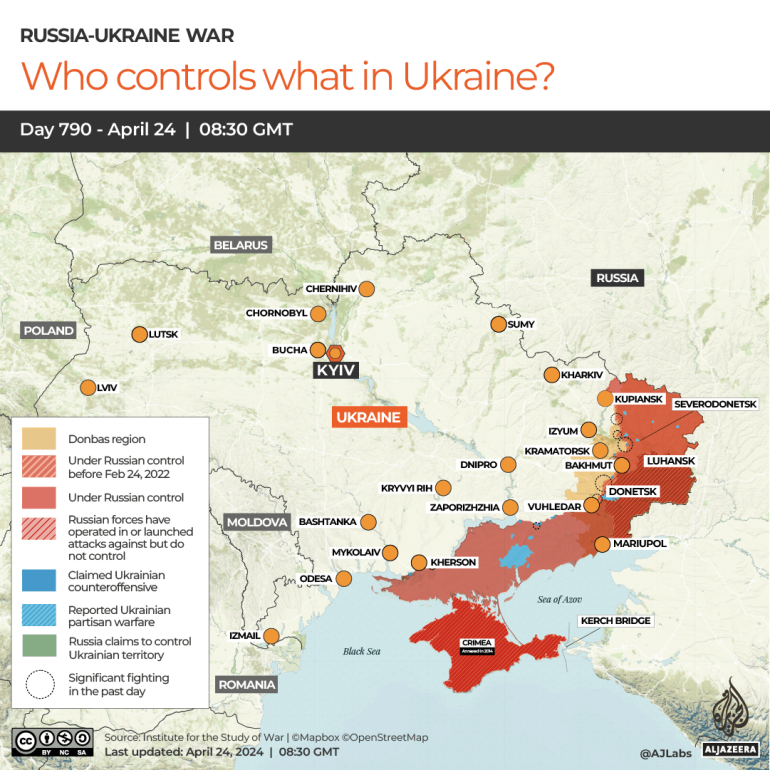“I survived that war and will survive this one,” Lidya Stepanovna said, referring to World War II and Russia’s full-scale invasion of Ukraine.
Huddled up in a woollen shawl and a warm grey coat, she said, in a video released on Monday by Ukraine’s Ministry of Internal Affairs, that after Russian shelling burned down her house, she had to trudge for 10 hours, gunfire and blasts ringing out behind her.
She fainted and fell twice, but kept getting up and moving on until White Angels, a police unit that evacuates civilians from front-line areas, picked her up.
The woman left Ocheretyne, a Donetsk town with a prewar population of about 3,400 that stands in a lush, flat steppe. The town had been occupied by Nazi Germans between 1941 and 1943 – and fell to Russians earlier this month.
“Everything is upside down there. Everything is scary,” she said.
In recent weeks, outmanned and poorly supplied Ukrainian forces have been losing ground in the eastern Donetsk region that has been contested since 2014 between Kyiv and Moscow-backed separatists and that has become the war’s new focal point.
The Russians intensified their attacks ahead of the arrival of US military aid that includes antitank missiles and 155mm-calibre shells that may put an end to the desperate “shell hunger” of outgunned Ukrainian troops
“We are firing one shell in response to 10 ones from their side,” a serviceman stationed in Donetsk told Al Jazeera.
The Russians pummel Ukrainian-held trenches, towns and villages with mammoth airdropped glide bombs and artillery fire, and relentlessly send troops, sometimes dozens of times a day, paying little attention to casualties and loss of armoured vehicles.
Ukrainian forces have retreated from Ocheretyne and several more towns and villages, creating a wedge for Russian forces and endangering larger towns in the Kyiv-controlled part of Donetsk.
‘We stormed without support’
Some Ukrainian servicemen with Brigade 155, which took over the town’s defence, blame its fall on their commanders’ mistakes.
“My company was literally destroyed, we carried out tasks in the worst conditions and no one cared, we stormed without support and with stupid command, we defended with almost no support and with the same stupid command,” one of the servicemen wrote on X, formerly known as Twitter.
A retired Ukrainian general said that the dominance of Ocheretyne’s high-rise apartment buildings over the surrounding steppe could have served as an effective deterrent against Russian troops and prevented the town’s takeover.
“What we have is a serious systemic failure,” General Serhiy Krivonos said in televised remarks.
The Russian side is predictably triumphant.
A pro-Kremlin military analyst blamed the fall on the mistakes of Oleksandr Syrskii, Ukraine’s new commander-in-chief of the armed forces, and the overall shortage of arms, ammunition and air defence.
“The downside is that all of Ukraine knows, all the servicemen know that there’s no money, no equipment, a dire shortage of air defence systems,” Vladimir Prokhvatilov of the Russian Academy of Military Sciences told the Kremlin-funded Radio Sputnik.
“And when Syrskii commands a withdrawal, people simply run, he provoked the panic himself,” he was quoted as saying.
Syrskii replaced Valerii Zaluzhnyi, an immensely popular top general who reportedly had a falling-out with Ukrainian President Volodymyr Zelenskyy over counteroffensive strategies and the urgent need to mobilise hundreds of thousands of men.
Analysts predict a major Russian breakthrough.
“This is a breakthrough not of tactical but of strategic level. And that’s why Russians will only strengthen their pressure,” Kyiv-based analyst Mikhail Zhyrokhov told Radio NV.
“The situation around Ocheretyne is very difficult and tends to only get worse. Because such an advance gives Russians huge advantages on the flanks. That’s why holding other towns, another line of defence will be very hard,” he was quoted as saying.
“In the Donetsk front, there is a large hole through which Russians can advance in three, four directions,” Nikolay Mitrokhin of Germany’s University of Bremen told Al Jazeera.
By deploying more forces, the Russians can destroy Ukrainian positions along the Bakhmutka River and advance for up to 15km (9 miles) in the southwestern direction without much resistance, he said.
But Ukrainian forces are not just going to give in.
“The situation is pretty bad, but it’s not clear what reserves Ukrainian forces will find and how Russian forces can break through minefields under constant drone attacks,” Mitrokhin said.
He is, however, pessimistic about Ukraine’s overall chances to turn the war’s tide as Kyiv is incapable of producing more arms domestically.
“Full packages of [Western] aid can only slow down the advance. No one is talking about ‘Ukraine’s victory’ or ‘liberation of [occupied] areas’, because Ukraine refused to mobilise its economy to restore its military-industrial complex,” he said.
The Russians want to move towards the largest towns in the Kyiv-controlled part of Donetsk – Kostiantynivka, Pokrovsk and Chariv Yar – that also serve as important logistical hubs.
Other analysts are not that pessimistic.
“Given the deficit of ammunition and manpower, the Ukrainian army is holding on the best way it can and then is gradually retreating,” Kyiv-based analyst Igar Tyshkevich told Al Jazeera.
“When a residential area is razed off the face of Earth, you either retreat or get your people slaughtered,” he said. “Once the [Western] ammo is here, there will be stabilisation.”
Another Ukrainian serviceman who serves in Donetsk said that in recent weeks Kyiv ramped up its efforts to build a heavily-fortified defence line.
“Luckily, we began building fortifications that resemble those of Russians,” he told Al Jazeera.
